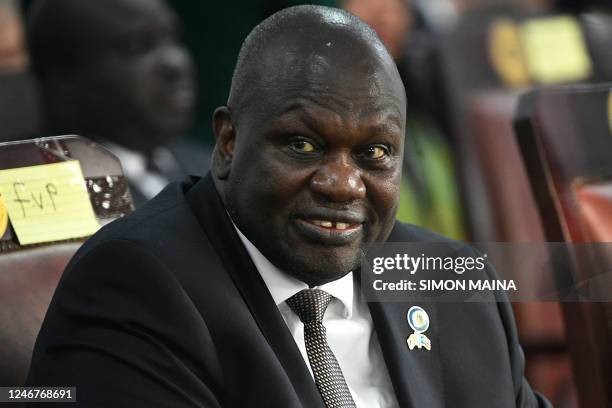By Philip Buda Ladu
United States and other western embassies in Juba have urged President Salva Kiir Mayardit to release his deputy and political rival, First Vice President Dr. Riek Machar, from house arrest amid escalating tensions in the capital, Juba.
In another joint statement, the Embassies of France, Germany, the Netherlands, Norway, the United Kingdom, the United States and the Delegation of the European Union express their grave concern over reports that First Vice President Machar has been placed under house arrest.
“We call on President Kiir to reverse this action and to prevent further escalation. We note that First Vice President Machar’s position in the government is established under Article 1.7.2 of the 2018 Peace Agreement (the R-ARCSS). We further call on President Kiir and all leaders with control or influence over armed groups to order an immediate ceasefire,” partly read the statement.
“We impress upon leaders of all parties the urgent need to engage without delay in direct dialogue, and demonstrate the sincerity of their assertions that they are working for peace,” it added.
The Sudan People’s Liberation Movement/Army in Opposition (SPLM/A-IO) reported on Wednesday evening that the Minister of Defence and the National Security Chief forcibly entered Machar’s residence in Juba with an arrest warrant issued under orders from President Kiir.
A senior SPLM-IO official, Reath Muoch Tang, stated that Machar, his wife, and two bodyguards were being held at his residence in Hai Amarat near presidential palace J1.
He added that the SPLM/A-IO chairman was accused of involvement in recent clashes between government forces and the White Army militia in Upper Nile State earlier this month.
International Concerns
The U.S. Bureau of African Affairs, in a statement posted on X (formerly Twitter), expressed deep concern over Machar’s reported house arrest.
“We are concerned by reports that South Sudan’s First Vice President Machar is under house arrest. We urge President Kiir to reverse this action and prevent further escalation of the situation,” the statement read.
Under a 2018 peace agreement that ended a five-year civil war, South Sudan has five vice presidents, with Machar and Kiir serving together in a fragile unity government. However, tensions between their respective factions have persisted.
The United Nations has warned that recent fighting in Nasir, between the government army and the White Army—a militia associated with Machar—along with increasing hate speech, could rekindle the ethnic violence that fueled previous conflicts.
Machar’s party has denied any current ties to the White Army.
“It is time for South Sudan’s leaders to demonstrate sincerity in their stated commitments to peace,” the U.S. Bureau of African Affairs added.
The military and government spokespersons have not yet commented on Machar’s arrest or the unfolding political crisis.
Meanwhile, the U.S. Embassy in Juba announced on Wednesday that it was further reducing staff due to security threats in the country.
“South Sudan is a Level 4 ‘Do Not Travel’ country. We urge U.S. citizens currently in South Sudan to consider departing via commercial means while they are available,” the U.S. Embassy warned.
The embassy also advised American citizens who choose to stay in South Sudan to prepare contingency plans and be ready to shelter in place should conditions deteriorate further.
Earlier two European nations including, Germany and Norway have temporarily closed down their embassies in Juba citing the heightening political tensions and reported attacks in the country.
Call for regional intervention.
United Nations Mission in South Sudan (UNMISS) has urged restraint, following Machar’s house arrest, warning that the country risks sliding back into widespread conflict.
“This will not only devastate South Sudan but also affect the entire region,” UNMISS chief Nicholas Haysom stated.
Earlier this month, Kiir’s government arrested several SPLM-IO officials, including Petroleum Minister Puot Kang Chol and Deputy Army Chief Gen. Gabriel Duop Lam, following clashes in Nasir, Upper Nile State. The violence led to the killing of the area’s military commander and a UN pilot during a rescue mission.
Ter Manyang Gatwech, Executive Director of the Center for Peace and Advocacy (CPA), issued an urgent appeal on Thursday, calling on Kenya, Ethiopia, South Africa, Tanzania, and the African Union to convene in Juba to arrest the escalating crisis.
“The actions taken by the Government of South Sudan pose a dangerous threat and could lead the country back to instability. The intervention of Kenya, Ethiopia, and the African Union is crucial to prevent a potential civil war,” Manyang said.
He urged the international and regional leaders to intervene immediately, emphasizing that South Sudan’s stability is at stake.
Expressing deep concern over Machar’s detention, Manyang stated that the arrest has left citizens in Juba fearful and restless.
“I also urge President Kiir to reverse actions that undermine the trust and confidence established by previous leaders in the country. This is a crucial time to demonstrate effective leadership and wisdom in resolving any problems,” he added.
Calls for Direct talks
The CPA proposed a face-to-face meeting between Kiir and Machar, either in South Sudan, Ethiopia, or Tanzania, to address the security situation and prevent further escalation.
The civil society organization emphasized the importance of direct dialogue between the two leaders in determining the future of the country.
With tensions rising, regional and international actors are closely monitoring developments, fearing that without urgent intervention, South Sudan could slide back into violent conflict.




